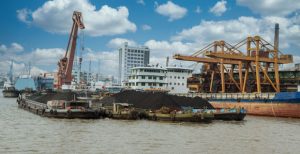China raises rare earth production quotas to record levels as prices surge
China has previously been cast in a sinister role with respect to restricting the production and export of critical rare earth metals, usually salts, used to produce a host of products. Those products include magnets for consumers electronics and electric cars, defense equipment and advanced ceramics.
But while the country deliberately created a near monopoly position in the global rare earths refining market, it created a horrendous environmental problem in the process.
Stay up to date on MetalMiner with weekly updates – without the sales pitch. Sign up now.
Rare earths consolidation and rising prices
In an effort to clean up its environmental act and to gain better control over what had become a wild west mining and refining landscape, Beijing engineered consolidation in the industry to fewer but larger entities.
However, that’s when the criticism started, as China capped exports, causing a spike in prices.
That was largely short-lived. Prices returned to earth after a spike in 2017. However, prices have been rising strongly again this year due to surging demand, both within China and without.
Prices are up between 20-50% this year alone. Surging demand has fueled a bidding war for supplies in a constrained market. With China holding some 85% of global refining capacity and the only mine to refined products supply chain, it not only has a unique position but a unique responsibility in the market.
Maybe in part to try and avoid accusations of manipulating the market, Beijing has increased output this year. Output is up 20% to the highest levels on record, according to Reuters.
The Ministry of Industry and Information Technology said 2021 rare earth mining output had been set at 168,000 metric tons. That is up from 140,000 metric tons last year.
Meanwhile, the 2021 quota for smelting and separation — or processing of rare earths into a form that can be used by manufacturers — is 162,000 tons, also up 20% on the year before.
Domestic demand
Although by far the world’s largest miner of rare earth ores, so great is domestic demand for the refined products that China remains a net importer, particularly — and somewhat ironically, when you consider all the coverage of China versus the U.S. in the rare earths market — from the U.S., but also from Myanmar.
In practice, the the U.S. and China’s REE supply chains are closely interlinked. The U.S. is a very significant miner. However, it lacks the economic means to refine ores into useable compounds. Meanwhile, China is a major miner. However, it lacks sufficient supply to meet domestic and international demand for refined products, hence the two-way trade.
The U.S. is pouring hundreds of millions into supporting the development of a domestic refining industry. It is doing so through tax breaks, direct grants and assured contracts.
But in such a highly regulated marketplace, environmental, power and employment costs have made refining challenging in the U.S.
Maybe the last part of the jigsaw, high prices, will be enough to get comprehensive domestic refining a reality again in the U.S.
More MetalMiner is available on LinkedIn.



Leave a Reply